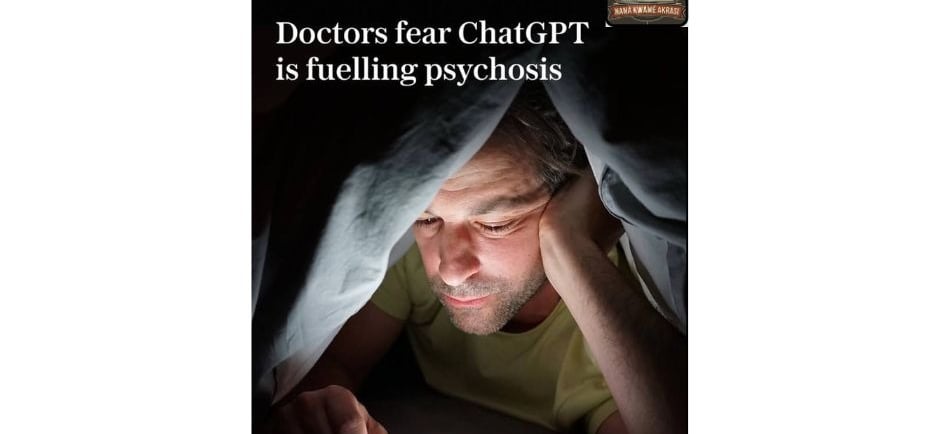" Doctors Fear ChatGTP is Fueling Psychosis" - Is AI Messing With Our Minds?
In a shocking twist, some doctors are raising red flags about ChatGTP
NANA KWAME
7/28/20252 min read


ChatGPT may be driving people to psychosis as millions of people turn to artificial intelligence (AI) for friendship and advice, NHS doctors have warned.
Psychiatrists from the health service and university researchers say there is growing evidence that AI chatbots might “contribute to the onset or worsening” of psychotic mental health conditions.
In a new academic paper, a dozen doctors and other experts say AI chatbots have a tendency to “mirror, validate or amplify delusional or grandiose content” – which could lead mentally ill people to lose touch with reality.
In particular, chatbots’ tendency to agree with users could worsen delusions in the mentally ill. OpenAI, whose ChatGPT has been downloaded 900m times, has admitted its chatbots have engaged in sycophancy and heaping unnecessary praise on users.
Dubbed “ChatGPT psychosis”, dozens of people on social media have claimed that loved ones have had a mental health breakdown after becoming addicted to ChatGPT.
Symptoms of psychosis can include difficulty distinguishing between what is real and what is not and a belief in bizarre delusions.
Dr Tom Pollak, a lecturer at King’s College London and one of the authors of the paper, said reports of ChatGPT psychosis have included individuals “embracing a messianic mission” or claiming to have been “taken to some next stage of human evolution”. He said: “I am not sure in those cases whether it is ChatGPT that has got them worse. But it was enough to make me comment that maybe they need to ease up on this. Rather than getting home and having mind-expanding conversations, perhaps it is time to close your laptop.
“All we know at the moment is there are people experiencing the onset of delusional thinking, and that happens around the same time as they start increasing their use of AI.”
Dr Pollak added in a post on Substack that psychosis rarely appeared “out of nowhere” but that heavy AI use could be a “precipitating factor” in people with underlying conditions.
‘Tip of the iceberg’
There have been increasing reports linking chatbots with mental health episodes.
In April, a man was shot and killed by police in the US after threatening officers with a butcher’s knife. His father later claimed he had become obsessed with ChatGPT and Claude AI, creating a digital girlfriend called “Juliet” whom he believed OpenAI had killed.
The concerns come amid a push by tech giants to use their chatbots as an alternative to therapy despite evidence they could worsen conditions. A paper from Stanford University found many therapy bots provided bad advice to patients showing signs of delusions and only “answer appropriately about 45pc of the time”.
Søren Dinesen Østergaard, a professor at Aarhus University Hospital, in Denmark, wrote a paper in 2023 saying AI chatbots could “generate delusions” in those at risk of psychosis.
“We may be facing a substantial public mental health problem where we have only seen the tip of the iceberg,” he said.
An OpenAI spokesman said: “We know people are increasingly turning to AI chatbots for guidance on sensitive topics. With this responsibility in mind, we’ve carefully trained ChatGPT to respond empathetically and sensitively and to recommend professional help and resources when appropriate.”
